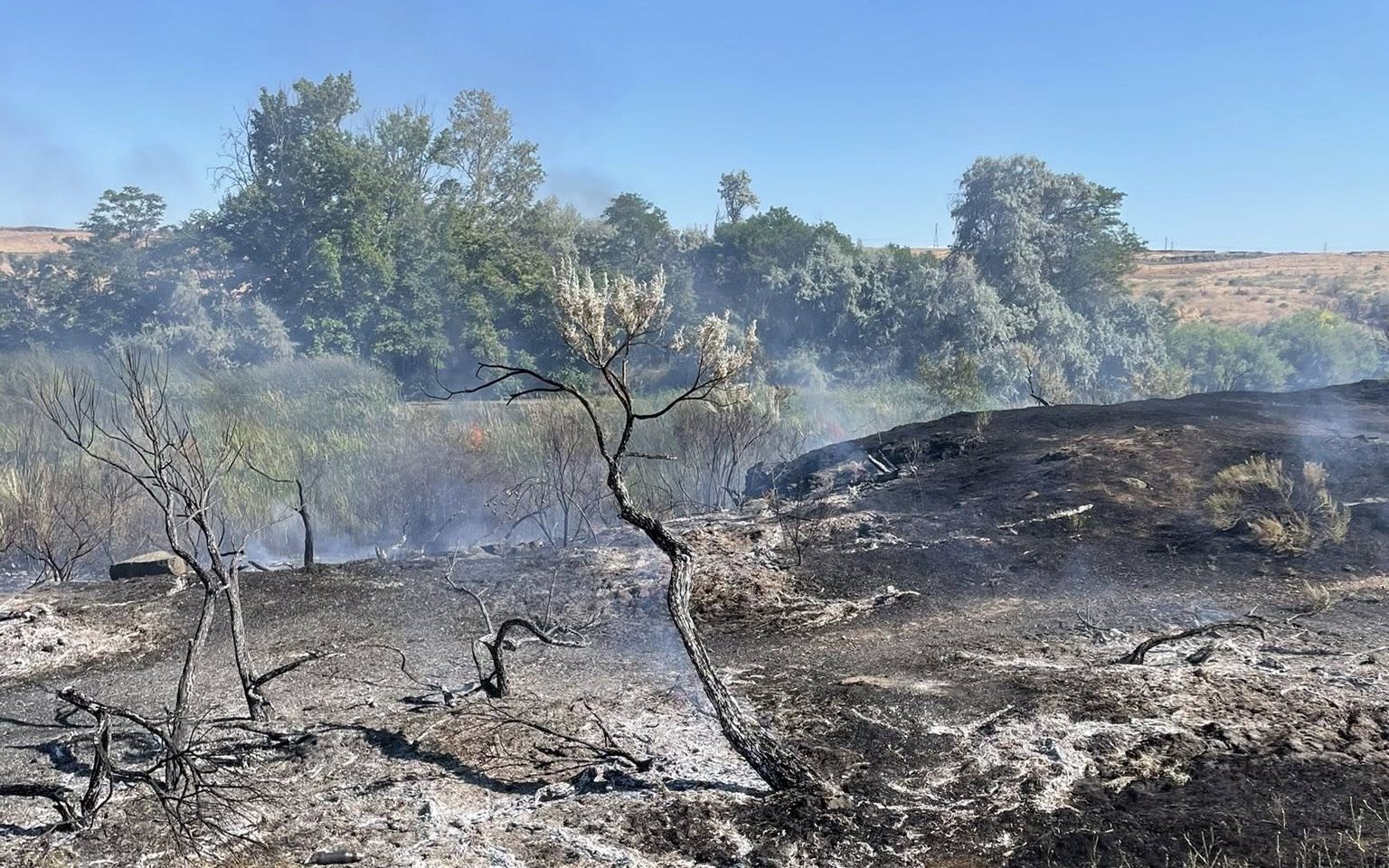One year later: Flood alters family’s future plans
Published 5:00 am Tuesday, February 9, 2021

- Brent Hall poses for a photo with his daughters Ava, 13, and Violet, 11, before the daddy-daughter dance on Feb. 8, 2020, two nights after floodwaters inundated their home. Hall expressed thanks to Rachael Owen for wading through the flood water to retrieve dresses and a suit for the dance.
MISSION — The floods of February 2020 still weigh heavy on the minds of Brent Hall and Rachael Owen, whose home on River Road, about 12 miles east of Pendleton on the Umatilla Indian Reservation, was determined to be too damaged to repair after muddy Umatilla River water flowed into the interior.
Water marks were 2 feet high on the interior walls. Pastureland was scoured raw by rocks that tumbled down the river, and most of it was left covered with several feet of river rock, and in other places huge gaping holes. They later learned they couldn’t rebuild because the property is in the flood plain.
The destruction to the property was so severe that when Oregon Gov. Kate Brown made a disaster declaration for Umatilla County and wanted to see the damage first-hand, the home of Hall and Owen was the upriver house she visited.
Hall and his family had been living in their River Road home since October 2018 when Hall and Owen sold their home on the North Hill in Pendleton with hopes of raising their two daughters, Ava, 13, and Violet, 11, with the accessories of a country lifestyle — cattle, a horse, cats and a dog.
After the flood, Hall and Owen tried to find a new home in Pendleton, but ended up moving to Walla Walla, Washington. Hall, an attorney for the Confederated Tribes of the Umatilla Indian Reservation, works from home. Owen closed her Main Street photography studio in Pendleton two months ago and turned an outbuilding at their new place into her workspace.
“The flood definitely completely altered our future plans,” said Hall. “We’ve had to develop a new plan. The flood has been instrumental in teaching the value of being flexible, learning to roll with the punches.”
The emotional roller coaster has faded somewhat, Hall said, but he is still dealing with the Federal Emergency Management Administration (FEMA), which partners with private insurance companies for flood insurance. Hall had $250,000 in flood insurance, but the insurance company says it will pay only half of that, which does not come anywhere near covering their loss.
“That’s another nightmare,” Hall said. “There are days when I feel like I’m just pounding my head against a cement wall trying to make some progress.”
Hall appealed the decision to FEMA, but has heard nothing since July 2020.
“There’s no place to call about the status. We try and they say we’ll get back to you,” Hall said, recognizing how “overloaded” FEMA has been with the flooding, the COVID-19 pandemic and wildfires — and that’s just in Oregon.
“If it were like fire insurance, regular homeowner insurance, the appeal would go to state court where homeowners have some leverage,” he said. “You don’t have that leverage with state court. If FEMA doesn’t award what we believe we’re due, we’ll have to file suit in federal court, but we’ll still be at a disadvantage.”
Because of their income, Hall and Owen don’t qualify for aid from FEMA, but the Small Business Administration (SBA) is providing a disaster loan to help them acquire a new place to live.
Initially hoping to rebuild, Hall and Owen learned they would not be able to get the permits they needed because the damage was so bad that major reconstruction would be needed, and the local building codes don’t allow for that in the flood plain.
“Once we figured out we weren’t going to rebuild, we started trying to figure how to buy new with a mortgage on the old house,” Hall said. “The SBA loan helps with the mortgage on a new house and is supposed to help us refinance the old mortgage at a lower rate. But it’s hard to find sellers who will accept those kinds of deals.”
Hall and Owen looked for a new home in the Pendleton area for months.
“We tried to buy four or five houses, but none worked out,” he said.
So they widened their search and found the house in Walla Walla, where they are renting until the SBA loan comes through.
The Confederated Tribes of the Umatilla Indian Reservation, working with FEMA, is buying damaged homes and property with plans to restore the natural habitat and let the Umatilla River chart its own course. The Tribes have made a site visit to Hall’s old residence, which includes the 2,000-plus-square-foot house, a fully insulated shop and a two-car garage with a finished apartment, plus a corral, sauna, outdoor shower and wellhouse. It had a fully landscaped yard with mature fruit trees, grapevines, berries, and an irrigated cross-fenced pasture, all on 4 acres that stretched to the Umatilla River.
“We’re hoping the Tribes can buy out our property and, hopefully, what they offer will get close to making us whole,” Hall said.
Hall learned that the floods were projected on Feb. 5, 2020, the night before nearly 2 feet of snow combined with warm temperatures and 4 inches of rain in 24 hours sent the level of the Umatilla River to more than 12 feet — four times its average. Flows measured at 13,500 cubic feet per second at Gibbon caused flooding from Bingham Springs, 41 miles east of Mission, to Echo and Stanfield, 30 miles west of Mission.
Hall and his neighbor, Jeremy Moore, took turns checking on flows through the night and early the next morning. About 7 a.m. on Feb. 6, 2020, Moore came home from work and the two worked for two hours building a small levee around Moore’s shop.
By the time Hall returned home the water was fully across his yard, through the driveway, into the shop and was lapping at the home’s back door.
“At that time I still thought it would be OK because the house sits up on the property, but it kept rising and pretty soon we realized we needed sandbags and to get our vehicles moved to a safe spot,” Hall said.
Two vehicles were so wet and muddy they were totalled.
By 11 a.m., the oncoming devastation was obvious.
“Luckily, thank God for Pros Picard (CTUIR maintenance program manager),” Hall said. “He was able to get sandbags out to our area pretty quickly, but by then you couldn’t drive to my house. The only way to get there was on a tractor. We drove back and forth in the tractor to get sandbags, and then put them around the doorways of the house.”
The sandbags and the addition of hay wasn’t enough. It became a “race to get as much stuff off the floor to protect our belongings.” Hall and his friend, Wes Duchek, moved through the house, transferring anything on the floor to a higher spot.
They placed the bottom drawers on top of their dressers and tried to save the girls’ clothes, pictures, musical instruments — anything that would be lost to the muddy water.
By this time, the water had fully surrounded the house and “once we saw it coming under the back door we knew we had to leave.” Hall and Duchek plowed through the raging river on Hall’s old tractor to the railroad tracks where Owen was watching things unfold.
“I got out and realized I’d left my work laptop and had to make one more trip. The water was coming through the back door. It was roaring pretty fast all around us,” Hall said.
Hall and Owen returned two days later to see the mess.
“At that point, we were still thinking the damage was minimal because of the way the house sat up, but we were wrong,” Hall said.
There was mud throughout the house, the walls were saturated, the electrical system was soaked.
“It was pretty shocking,” Hall said.
Friends arrived to help with cleaning before two volunteer outfits — Samaritan’s Purse and the Pendleton Church of Jesus Christ of Latter-day Saints — helped cut out the drywall and hauled away mud. Both groups helped with the cleanup of several homes on the reservation.
“We were so lucky and fortunate to have the help of the Mormons,” Hall said. “They brought out heavy equipment and helped deposit rock and gravel in the driveway that was scoured out with huge gaping holes. They cleaned out the feet of mud left in the shop and the garage, helped pack up our remaining personal property, and really just helped however they could, including to give us hope.”
Other friends donated food, firewood and hay, and the use of a large Kubota tractor. The CTUIR placed dumpsters around the area that “we filled up I don’t know how many times.”
The Tribes also put the family up in a room at Wildhorse Resort & Casino. The family “couch surfed” for a week before the girls went to their grandparents’ home and Hall and Owen slept in Rachael’s photo studio for a bit. Then a friend with a small rental let them rent that house until they could find a larger place for the family.
“Everybody was incredibly kind. It was a great outpouring from the community,” Hall said. “And the Tribes responded immediately to everyone in need on the Reservation, providing a place to sleep, coordinating aid and cleanup, and pushing for more help from the state and the federal government. Looking back, the response of the entire area was tremendous, and helped a lot of people facing a very difficult time in their lives.”






